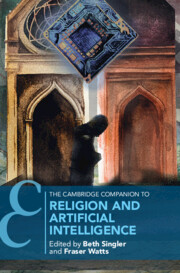Book contents
- The Cambridge Companion to Religion and Artificial Intelligence
- Cambridge Companions to Religion
- The Cambridge Companion to Religion and Artificial Intelligence
- Copyright page
- Contents
- Contributors
- Acknowledgements
- 1 Introduction
- 2 Steps towards Android Intelligence
- Part I Religions and AI
- Part II Social and Moral Issues
- Part III Religious Studies
- 13 The Anthropology and Sociology of Religion and AI
- 14 Simulating Religion
- 15 Cognitive Modelling of Spiritual Practices
- 16 Artificial Companions and Spiritual Enhancement
- Bibliography
- Index
- Cambridge Companions to Religion (continued from page ii)
- References
14 - Simulating Religion
from Part III - Religious Studies
Published online by Cambridge University Press: 20 November 2024
- The Cambridge Companion to Religion and Artificial Intelligence
- Cambridge Companions to Religion
- The Cambridge Companion to Religion and Artificial Intelligence
- Copyright page
- Contents
- Contributors
- Acknowledgements
- 1 Introduction
- 2 Steps towards Android Intelligence
- Part I Religions and AI
- Part II Social and Moral Issues
- Part III Religious Studies
- 13 The Anthropology and Sociology of Religion and AI
- 14 Simulating Religion
- 15 Cognitive Modelling of Spiritual Practices
- 16 Artificial Companions and Spiritual Enhancement
- Bibliography
- Index
- Cambridge Companions to Religion (continued from page ii)
- References
Summary
Simulating religion through computer modelling can demonstrate how fragmentary theories relate, untangle individual lines of causal influence, identify the relative importance of causal factors and enable experimentation that would never be possible (or ethical) in the real world. This chapter reviews the application of computational modelling and simulation to religion, presents findings from specific simulation studies and discusses some of the philosophical issues raised by this type of research. Social simulations are artificial complex systems that we can use to study real-world complex systems. The best of these simulation models are carefully validated in relation to real-world data. Multilevel validation justifies confidence that the causal architecture of the simulation reflects real-world causal processes, thereby delivering an invaluable proxy system into the hands of researchers who study religion.
- Type
- Chapter
- Information
- The Cambridge Companion to Religion and Artificial Intelligence , pp. 241 - 256Publisher: Cambridge University PressPrint publication year: 2024

